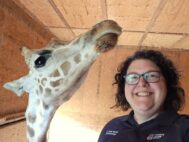Does Your Dog Need Glasses? Vet Courses Teach Removing Cataracts, Restoring Vision

Eye disease and trauma are common among many animals including dogs, cats, horses, rabbits and snakes but all too often, veterinarians need to refer those patients to a specialist because they lack the skills or confidence to treat the animals themselves.
Veterinarians and veterinary nurses/technicians from around the world attending the 23rd annual NAVC Institute in Orlando May 20 – 24 will gain extensive knowledge and hands-on experience in ophthalmology over four days of immersive hands-on training with world-renowned veterinary ophthalmologists.
The unique program enables veterinary professionals to master new skills they can immediately put into practice. In addition to ophthalmology, NAVC Institute provides in-depth education tracks on orthopedic surgery, small animal ultrasound, soft tissue surgery and strategic leadership for veterinary practice managers.
“The eye is unlike any other part of the body and almost always requires a specialist. The hands-on training and skills veterinarians and veterinary nurses/technicians gain at NAVC Institute, whether it’s in ophthalmology or orthopedic surgery, enable general practitioners to treat their patients, providing more immediate easily-accessible care.”
Kate Myrna, DVM, MS, DACVO, and Associate Professor at the University of Georgia’s College of Veterinary Medicine, will lead a four-day course on ophthalmology that includes:
- A hands-on examination workshop with pet dogs
- Eyelid surgery for veterinarians which she describes as “a little nip and tuck” for pets with excess eyelids like Shar Peis, Bulldogs or Persian cats
- Restoring vision to animals with cataracts, glaucoma or diabetes-related vision loss
As a practicing ophthalmologist and instructor, Dr. Myrna treats all kinds of animals and on a given day may treat a horse, hedgehog, dog and even the occasional giraffe.
“In today’s economic environment, not everyone has the means to accept a referral to a specialist. With less than 600 board-certified veterinary ophthalmologists in the entire U.S., many pet owners do not have access to a specialist, especially in some states where there aren’t any,” said Dr. Myrna. “By teaching veterinarians and veterinary technicians the basics of ophthalmology along with advanced skills, they will be able to provide an animal with the veterinary care it needs.”




